A people person: Homeland Director of Personal Care and Director of HomeCare embodies trust
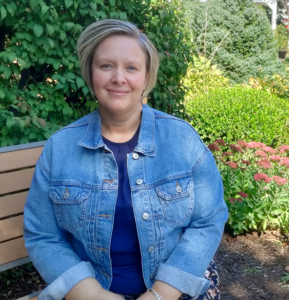 When Jennifer Murray gives tours to potential personal care residents and their families, she shares Homeland Center’s amazing 156-year history of devotion to the community.
When Jennifer Murray gives tours to potential personal care residents and their families, she shares Homeland Center’s amazing 156-year history of devotion to the community.
“We’re not going anywhere,” she said. “A lot of times, people like our homey feel. It’s cozy and comfortable here. When I’m doing tours, everyone stops and says hello, and that makes visitors feel welcome. It’s all genuine. That’s how it is all the time around here.”
Jen’s role has expanded since she first joined Homeland in 2016. With a career in nursing – the only thing she ever wanted to do – and 11 years in administration, she stepped in as Director of Personal Care in 2017.
Now, she is in the dual role of Director of Personal Care and Director of HomeCare. Like the Homeland Center personal care staff, the CNAs of Homeland HomeCare help clients through their daily tasks, ensuring they take their medications, eat right, and get any help needed with bathing, dressing, or other needs.
Maintaining Homeland’s stellar reputation for quality across a new front isn’t hard because the foundation of quality “was already there,” Jen said.
“The staff we have in place are exceptional in HomeCare and Personal Care,” she said. “The HomeCare clients absolutely love their caregivers. They care. They get involved. They will let us know if something seems wrong. Their relationships with families are so good that the families will often call the caregiver to tell them that a loved one has been hospitalized before they call the HomeCare office. That’s the level of trust they have in the staff.”
Speaking of trust, Jen is the person you’ve seen in Homeland Center’s television commercials. She is proud to raise awareness of Homeland’s exceptional care, whether at Homeland Center or in clients’ homes.
Her dual role lets her give inquiring callers more options – perhaps letting them know about home care if a loved one isn’t ready for a facility or pointing out available personal care suites for someone who can no longer live at home.
Once in Homeland, residents flourish. Jen works closely with the maintenance department, housekeeping department, and the dietary staff to uphold living and dining standards. She also collaborates regularly with the activities department, cooking up a roster of fun that keeps residents engaged. For Assisted Living Week 2023, Homeland held a fashion show, and residents’ family members got in the spirit, wearing everything from a Rosie the Riveter costume to Hawaiian shirts and leis.
“I love that our families get so involved,” said Jen. “If we invite them to things, tons of family members show up. I’ve never worked anywhere else where families were so involved. Our staff love the residents so much that it’s not work to do special things for them.”
Outside of Homeland, Jen and her husband enjoy traveling to regional sights such as the Poconos, Niagara Falls, and the Finger Lakes. A Florida fishing trip her husband dreams of, postponed by COVID, is back on for next year.
Jen also loves to cook, and she carries on her childhood tradition of Sunday dinners with family, including her daughter and son, who recently returned home from military service.
With her love of decorating, she also brings seasonal cheer to her office in Homeland’s original 19th-century building. Fall décor includes pumpkin figurines and a plaque saying, “I love fall most of all.”
“Fall is my favorite season,” she said. “I like the cooler weather. I love everything pumpkin spice. I just love all of the smells and colors of fall.”
Jen can say, with complete honesty, that work is fun. She carries on the Homeland tradition of treating staff respectfully, recognizing that they have family and obligations outside of work. In turn, the staff focuses on the residents’ needs.
It all comes back to that word — trust.
“Our families trust that their loved ones are going to get the care they need,” she said.
“I’ve had people come up to me and just say, ‘Trust,’ because they hear me say it in the commercials. People see our name, and that’s what they will think of,” Jen said. “You want to have someplace where you can trust the staff and know your loved ones will be cared for. It’s part of Homeland’s legacy.”

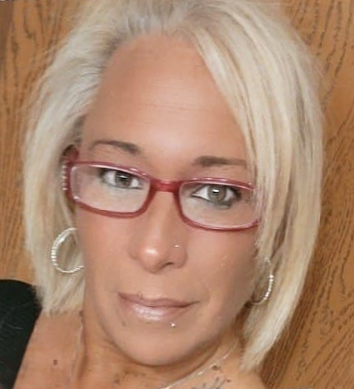
 Over the years, Homeland has learned that bringing together a talented group of professionals working toward a shared mission results in a successful workplace. Providing opportunities for employees to get to know each other outside of their job duties builds a team and creates a culture of compassion and friendship. The staff at Homeland strives to create an engaging culture where employees have fun through volunteering and spending time together.
Over the years, Homeland has learned that bringing together a talented group of professionals working toward a shared mission results in a successful workplace. Providing opportunities for employees to get to know each other outside of their job duties builds a team and creates a culture of compassion and friendship. The staff at Homeland strives to create an engaging culture where employees have fun through volunteering and spending time together. This summer, staff held a corn hole tournament with food trucks. Staff members who didn’t know one another were paired together to play in the tournament. Since then, Homeland staff members have volunteered at the Central Pennsylvania Food Bank and collected coats for children in need living in Cumberland and Perry counties through the Warm the Children program.
This summer, staff held a corn hole tournament with food trucks. Staff members who didn’t know one another were paired together to play in the tournament. Since then, Homeland staff members have volunteered at the Central Pennsylvania Food Bank and collected coats for children in need living in Cumberland and Perry counties through the Warm the Children program. “Our staff members have big hearts,” Kris Crockett, RN, BSN, CHPN, and Director of of Homeland Hospice said. “Working together to give back to the community has helped us create stronger bonds as coworkers.”
“Our staff members have big hearts,” Kris Crockett, RN, BSN, CHPN, and Director of of Homeland Hospice said. “Working together to give back to the community has helped us create stronger bonds as coworkers.”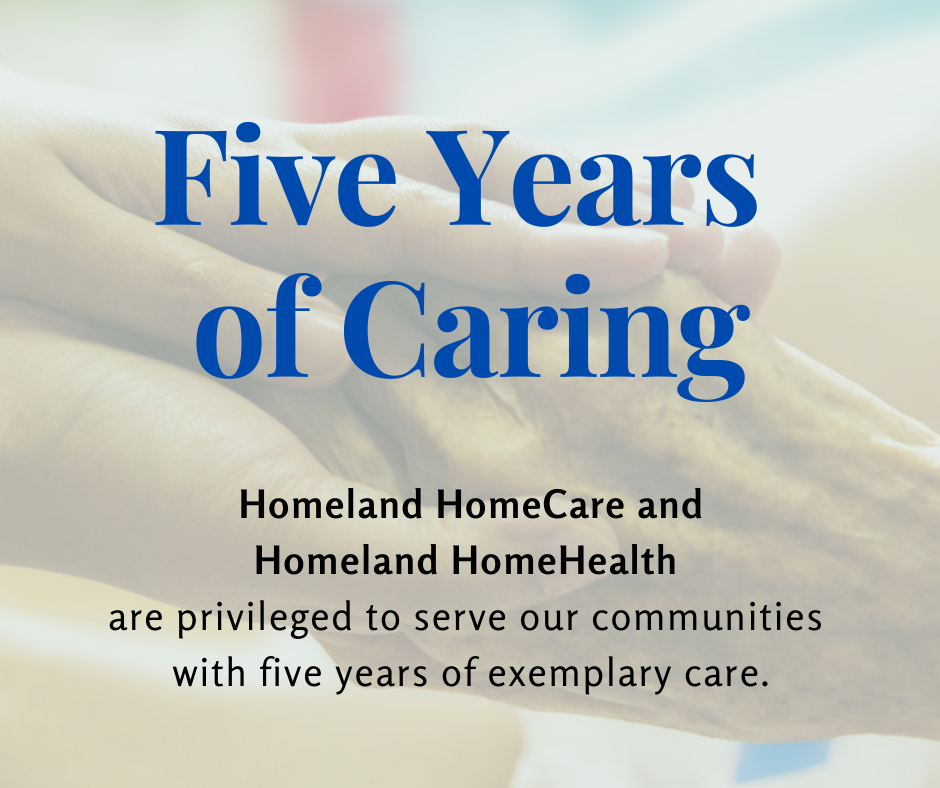 Since 1867, Homeland Center has been committed to meeting the ever-changing needs of the community. In keeping with this tradition, Homeland HomeHealth and Homeland HomeCare were established five years ago to provide a continuum of services for patients and their families using a team-approach, which places patients at the center of care. Since the launch of these services, thousands of patients have received exemplary care by a team who treats them like family.
Since 1867, Homeland Center has been committed to meeting the ever-changing needs of the community. In keeping with this tradition, Homeland HomeHealth and Homeland HomeCare were established five years ago to provide a continuum of services for patients and their families using a team-approach, which places patients at the center of care. Since the launch of these services, thousands of patients have received exemplary care by a team who treats them like family.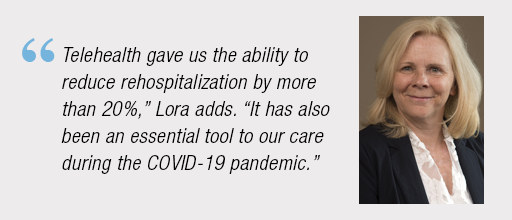
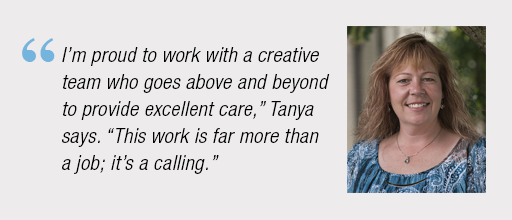
 We may not have control over the normal aging process or our genetic make-up, but we do have control over our lifestyles and the environment in which we choose to live. The following four lifestyle choices can greatly increase our chance of a healthy strong body as well as decrease our risk for disease and dementia:
We may not have control over the normal aging process or our genetic make-up, but we do have control over our lifestyles and the environment in which we choose to live. The following four lifestyle choices can greatly increase our chance of a healthy strong body as well as decrease our risk for disease and dementia: Loneliness affects more than 42 million older Americans according to the American Psychological Association. While living alone does not inevitably lead to loneliness, it can be a contributing factor. Social contact typically decreases with age due to retirement, spouse and friends dying or moving away, lack of mobility and physical limitations. When an entire peer group is experiencing these naturally occurring changes it is easy to see why there is a decline in the number and quality of relationships as we age.
Loneliness affects more than 42 million older Americans according to the American Psychological Association. While living alone does not inevitably lead to loneliness, it can be a contributing factor. Social contact typically decreases with age due to retirement, spouse and friends dying or moving away, lack of mobility and physical limitations. When an entire peer group is experiencing these naturally occurring changes it is easy to see why there is a decline in the number and quality of relationships as we age.
